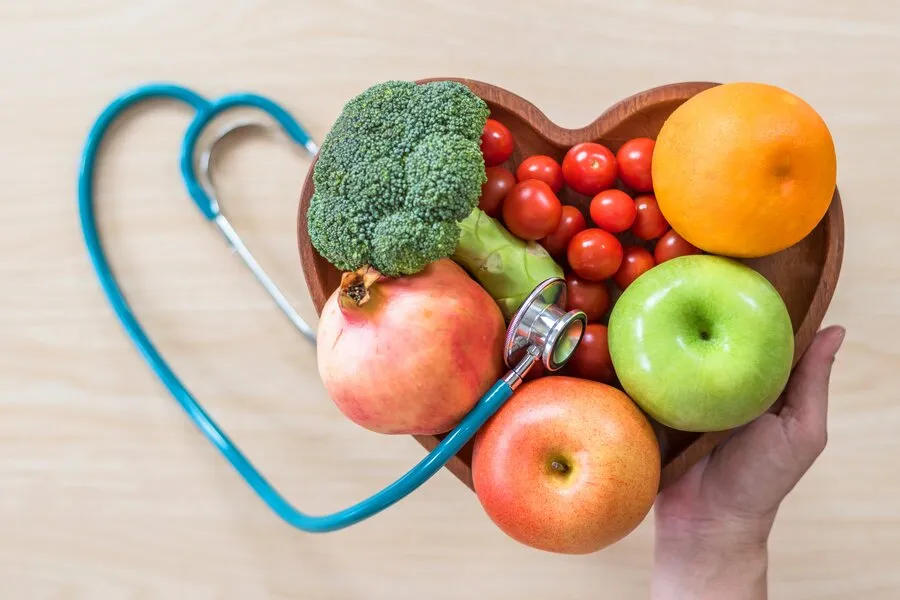What to eat for a healthy heart

Cardiovascular disease remains the main cause of death (36% among women and 34% among men). The prevalence of hypertension in the Cypriot population is 31.2% in males and 21.3% in females (26% total), while the prevalence of dyslipidaemia is estimated at 14%. The exact cause of CVD isn’t clear, but there are lots of things that can increase your risk of getting it. These are called ”risk factors”. The more risk factors you have, the greater your chances of developing CVD. Some risk factors include:
- Smoking
- High Blood Pressure
- High Cholesterol
- Diabetes
- Low physical activity
- Obesity
- Family History
- Ethnic background
In order to control this, it is essential to make nutritional modifications as well as lifestyle modifications.
Who may need a diet for heart problems?
This diet is required if you have any of the following conditions:
- Dyslipidemia i.e. high cholesterol, high triglycerides, etc
- Narrowing of arteries seen in Coronary Angiography (CAG)
- Percutaneous Coronary Angioplasty (PTCA) i.e. insertion of a stent in arteries
- Coronary artery bypass graft (CABG) i.e. bypass surgery
- Heart transplant
- Complications associated with heart disease, such as poor cardiac output, i.e., low pumping capacity of the heart
Why would you need guidance regarding diet for heart problems?
- A well-structured diet pattern is essential to maintain heart health for a longer period of time.
- Post-surgeries, a well-planned diet helps to improve the success rate of surgery.
- Positive lifestyle changes such as exercise, stress reduction techniques, control of hypertension and diabetes, and quitting smoking may reduce the occurrence of heart disease.
How can you benefit from this dietary guidance?
- With correct guidance on the diet for heart problems, you can maintain several parameters in acceptable ranges, including your body weight, cholesterol, triglycerides, LDL (bad) and HDL (good) cholesterol, blood pressure, etc.
- Once this is set in place, one can add happy and healthy years to life.
- Your nutritionist can provide you with different ways to tackle your cholesterol levels, as well as vacation special tips and festival special recipes.
How is diet for heart problems different from a general diet?
- A general diet may not involve careful selection as well as quantification of fats.
- Avoidance of saturated and trans fats is extremely essential for a diet with heart problems.
- Use of high-fiber foods, including whole cereals, vegetables, and fruits, helps in lowering the complications that arise due to a high-fat diet.
- Along with the above, cessation of smoking and limiting the use of alcohol are indispensable parts of a diet for heart problems.
Questions I get asked by cardiac patients
Fancy salts such as Himalayan, fleur de sel, Maldon, and pink salt have large crystals that are pretty to look at, but their sodium content is the same as the regular table salt in any salt shaker. They are not healthier than table salt. All types of salt contain sodium, which is a key nutrient of concern for people with high blood pressure. To prevent hypertension and reduce blood pressure, the American Heart Association recommends reducing sodium intake to 2000 mg per day, yet the population gets 3575 mg/day. Swapping table salt for fancy salt is not the answer. Instead, cut back on sodium and amp up flavour with herbs, spices, nutritional yeast, vinegar, or a squeeze of citrus.
Lemons, especially lemon peels, contain high amounts of phenolic compounds, flavonones, vitamins, minerals, and essential oils. Lemons and other citrus fruits also contain a special flavonone called hesperidin. Many animal studies show how hesperidin lowers systolic and diastolic blood pressure and reduces inflammation and oxidative stress. Evidence also shows that daily consumption of lemons, in addition to walking, will help lower blood pressure. And lastly, other evidence shows that fruit consumption of 530-600mg daily may also protect against high blood pressure.
Be careful; some medications might be affected by citrus; therefore, please consult your dietitian or your GP.
Brown rice has more fiber than white rice. As a whole, diets that are rich in fiber from whole grains, like brown rice, oatmeal, and barley, can help lower blood pressure and cholesterol. Studies show that eating more whole grains in place of refined grains is also better at keeping blood sugars stable.